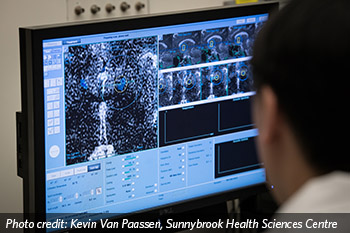 Researchers at Sunnybrook Health Sciences Centre published data indicating that focused ultrasound is safe and effective in addressing the symptoms of treatment-resistant major depression and obsessive-compulsive disorder (OCD).
Researchers at Sunnybrook Health Sciences Centre published data indicating that focused ultrasound is safe and effective in addressing the symptoms of treatment-resistant major depression and obsessive-compulsive disorder (OCD).
Focused ultrasound was used to target and cause a lesion in a brain pathway known to be active in both mental health disorders. This region of the brain is called the anterior limb of the internal capsule and is connected to areas of the brain involved with anxiety and other emotions.
The results of two first-in-North-America, phase I clinical trials were published in Molecular Psychiatry. Of the twelve total patients treated at Sunnybrook, fifty percent reported an improvement in their quality of life. Moreover, researchers found cognitive ability was not negatively impacted by focused ultrasound therapy.
Of the study participants who did not see an improvement, researchers say this may be due to challenges targeting key areas with focused ultrasound because of skull thickness or unique brain structure. The study also found that OCD responded better to the focused ultrasound treatment than depression, as 66 percent of patients with OCD versus 33 percent of those with depression made significant improvements. Researchers say this could result from the underlying differences between these disorders in the brain.
Researchers emphasize that focused ultrasound is not a “one-stop” treatment solution. Patients must work with their healthcare providers to determine appropriate treatment for their needs.
“Our study supports the importance of continued research into focused ultrasound as a safe and innovative treatment approach for patients with difficult to treat OCD and depression,” says Dr. Nir Lipsman, the study’s principal investigator and Director of the Harquail Centre for Neuromodulation at Sunnybrook. “Patients with these debilitating neuropsychiatric conditions have tried conventional treatments without success and are in need of novel treatment options.”
The Focused Ultrasound Foundation, based in Charlottesville, Virginia, supported this clinical trial, along with other philanthropic donors.
“The study findings offer hope for the future for patients and families who are searching for new treatments,” says Dr. Neal F. Kassell, MD, Chairman of the Focused Ultrasound Foundation. “Sunnybrook is one of the Foundation’s Centers of Excellence in focused ultrasound, and the site is a leader in all facets of focused ultrasound research. We are proud to support this innovative team.”
